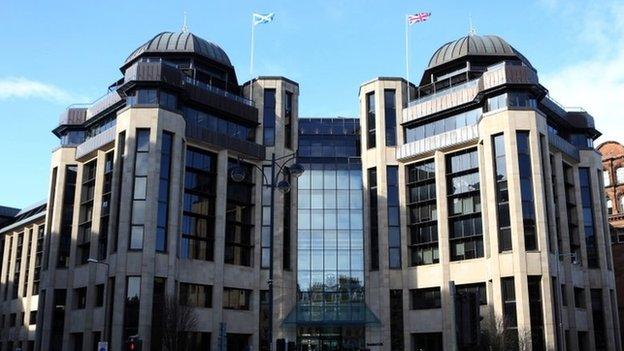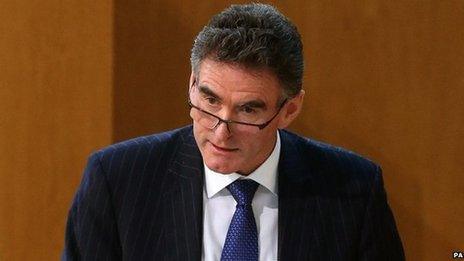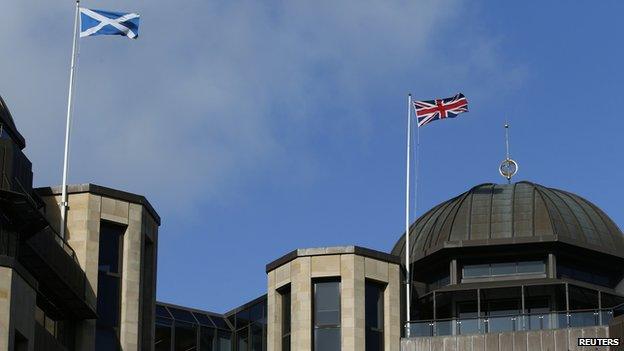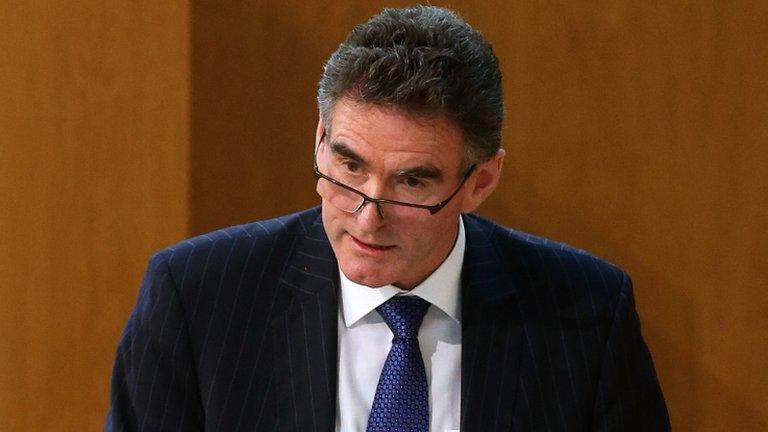Scottish independence: Investment risks and business rewards
- Published

Standard Life is drawing up plans to move operations out of Scotland
Business is about opportunities. Investing is about risk. Two sides of the same coin.
That's an aphorism I just made up, which I'd like to think gets to the heart of the issue about Standard Life and Royal Bank of Scotland setting out their concerns over Scottish independence.
On Wednesday, at a Holyrood committee hearing, the sunny optimism of entrepreneur Jim McColl was seeing opportunity from a government in Edinburgh exercising the levers of power to coax more growth out of business. Why wouldn't a country want that, he asked?
The sunshine didn't last long. At daybreak on Thursday morning, the big corporates were weighing in with warnings to investors about risk.
They are legally required to do this. Company accounts have to be open with investors about the risks being taken. In RBS's 205 pages of annual report (and that's just the main document), some 66 pages were all about risk, divided into sections on liquidity and funding, market, credit and country risk.
You'll recall that it wasn't a part of RBS thinking that featured all that prominently ahead of its 2008 bailout. So although it's a long, hard read, we should be grateful than someone in Gogarburn headquarters is assessing what risks the bank is taking, and we can hope that the directors are now paying attention.
Let's hope they also understand when, on page 172, it states (and I've picked this at random):
"The decrease in credit derivatives notionals and fair values was driven by increased use of trade compression cycles and novation of certain trades in Markets".
'Sobering'
The references to Scottish independence were a bit clearer than that. For the "Yes" side of the independence campaign, the less welcome element of the risk assessment said that a "Yes" vote "would be likely to significantly impact the group's credit ratings".
It didn't appear to be arguing the impact would be in a good way.
When interviewed, Ross McEwan, the new chief executive, chose not to say much about this. He was emphasising the bit where it said this risk is impossible to quantify, and also helpfully pointing out that the decision is for Scottish voters.

RBS chief executive Ross McEwan was not talking about preparing to move his bank operations out of Scotland
He had enough difficulties in handling his "not good and sobering" £8.2bn loss, and the £576m bonus pot to be found at the end of the RBS rainbow.
Nor was Ross McEwan talking about preparing to move his bank operations out of Scotland.
At least three reasons for this; RBS's unique, state-controlled status means he's best to steer clear of that kind of trouble: it's no secret that decision-making power at RBS is now in London, as with Lloyds Banking Group: and according a report in the Financial Times, Mr McEwan's predecessor, Stephen Hester, had quietly been doing that contingency planning anyway.
Pension giant
Standard Life, however, is in a very different position. It starts from a point of financial strength. Power genuinely lies at its Edinburgh headquarters. And its business is in selling long-term financial products to customers who mostly reside in other parts of the UK.
Having recently de-mutualised, Standard Life has a large base of 1.5m shareholders. Between them and the customers, they need a bit of reassurance that the company's on top of their concerns. And the PLC was required by those accounting rules to set out what it's doing to handle any risks arising from the vote on independence.

Using the pound without a currency union could pose "initial risks" to borrowing from the markets
For Standard Life to be drawing up plans to move operations out of Scotland is perhaps not that surprising.
With a company and stakes as big as that, you could argue it would be more surprising if it were not doing so. And it's worth noting how carefully the statement was phrased to make clear that this wasn't a judgement on the pros and cons of independence as it is being pitched to voters, but a judgement on the implications for the business.
The currency risk is the one that's brought this business concern to a head, as it's clear Holyrood and Westminster are in total disagreement.
The regulatory concern has to do with the need to reassure customers that their money's being invested to high standards, and that there's clarity to any consumer protection. RBS is used to working with many regulators. Standard Life deals with only a handful, so an extra one in its home market would add cost and complexity.
Top rate tax
Standard Life and RBS both raised a question over access to European markets while Scotland's membership of the EU is in doubt. The pensions giant has a business in Germany. Note, however, that these many pages of risk also raised concerns about the proposed referendum on UK membership of the EU.
And then there was taxation. Pensions are designed with tax relief in mind, so products have to be different across the boundaries of tax jurisdictions. There was also the concern about personal taxation in Scotland after independence, and whether high earners would find top tax rates all that attractive.
At Standard Life Investments, managing £244bn of assets, chief executive Keith Skeoch has to attract fund managers out of London, in a very competitive bit of the job market. As this week's annual report showed he earned £4.2m for last year (his boss at Standard Life HQ, David Nish, is on a mere £4m), you get a sense of why top tax rates matter to these guys.
In any case, on the risk register, the unquantified risk to Scottish jobs - 5,000 of them in Edinburgh, many of high quality and skill levels - was what made this announcement rather explosive. In annual accounts which are even harder to comprehend than RBS's, this was one Standard Life risk that is very easily understood.
Standard & Poorer or Richer?
For investors, risk is often best contracted out to experts. Standard & Poor's offers such a service.
The credit rating agency has run its rule over the prospects for Scottish independence. It didn't reach a conclusion on a credit rating, but assessed some of the factors it would consider if, or when, it does.
For this it draws on its recently compiled "Sovereign Government Rating Methodology and Assumptions". The 11-paragraph assessment of Scotland means we don't have to read that document. So that's good. And in this polarised debate, the agency's contribution seemed unusually balanced.
It said the Scottish economy is clearly big and open and diverse enough to sustain "investment grade|" rating. That means from "BBB-" and up to AAA.
Scotland is deemed to have economic strengths, such as skills and flexible markets. It's got developed financial markets and it's got oil.
Yet both of those can also be problems. It could be sensitive to oil price changes, while the finance sector is unusually large for a country of Scotland's size, at roughly 12.5 times the country's output.
'Significant challenges'
The Scottish government has recently been arguing that finance is not as big as it's often presented, once rUK subsidiaries and their accompanying liabilities are removed from the balance sheet.
On the same day of a warning of finance houses move operations out of Scotland, Standard & Poor's made a rather strange observation. A pull-out could be good, it said, because it could reduce the size of Scotland's external balance sheet. It could be bad, however, if the exodus leads to volatility in investment and liquidity.
And what about currency? A deal with the UK "would provide considerable support" for Scotland's credit rating. That's support in a downward direction.
Using the pound without a currency union could pose "initial risks" to borrowing from the markets. With no monetary flexibility, it would fail on one of S&P's five factors for assessing sovereign risk.
Scotland would be "hard pressed" in getting to capital markets similar to the ones the UK has at present. Yet comparing Scotland with New Zealand, the agency thinks there's no reason Scotland could not float its own currency.
The challenges would be "significant, but not unsurpassable", concluded Standard & Poor. It doesn't look like a triple-A rating for a while yet.
- Published27 February 2014

- Published12 February 2014
